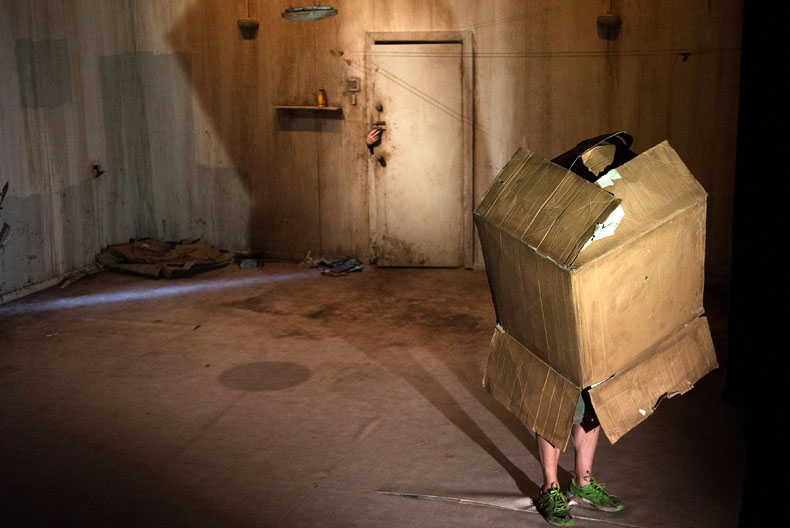
A dismal, grimy room with a cardboard box. Where are we? A prison cell? Or inside the mind of someone who has retreated from the world for some reason? A woman’s voice offstage talks to the box. The box talks back. Zach (David Woods) is suffering from post traumatic stress as a war veteran. He has become a vocal hermit crab, scuttling about the stage, an occasional finger or arm poking through the many holes in his shell (box) as he reacts to the voices around him. There is Carol, his wife and Ieuan, his friend both played by Jon Haynes and we never see Carol and only glimpse Ieuan as he offers help to Zach both through obtaining MDMA to try to help his condition and by trying to unlock the chained door which Zach cannot open himself.
This piece is the second part of a trilogy of plays by the theatre company, Ridiculusmus, explaining different approaches to mental health. The first tackled schizophrenia and the last will be about grief. Give Me Your Love emerged from exploring the therapeutic effects of MDMA on post traumatic stress in soldiers. Ridiculusmus was created, and is basically run by David and Jon, using humour and wit both visually and verbally to tackle serious issues, with minimal resources.
There is tremendous tenderness shown between the characters in this pieces as they try to help Zach and the dialogue is never heavy handed. It is ‘set’ in West Wales, and somehow the lilting Welsh accents (which are excellent) soften and humanize this difficult subject. At the post show talk, I was told that the play was initially done in American accents as this is where the first research of this kind took place, but it gave the play a brasher, harder quality which would perhaps have alienated an audience. The post show talks are an important part of the evening’s experience for the company and the audience to discuss the issues tackled.
Visually the performance has been called ‘a cross between a Beckett play and a Monty Python sketch’ and certainly the Beckett comparison rings true – think Happy Days, where Winnie is buried to her waist and neck in a mound of earth, or That Time, where the character sits silently and his own voice is heard recalling his past. The language is often banal and absurdity rules. In Give Me Your Love, the sight of a cardboard box with legs dancing to loud music or sitting in the front row of the auditorium reaching out to the public is both absurd and touching. Whilst fictitious, this play probably gives us more insight into the stress disorder condition than being read a scientific paper on the subject. If you miss it this time, the company may be putting on the whole trilogy in 2018. A must-see! ★★★★★ Karin André 4th May 2017

